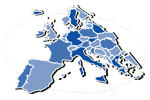|
|
|
|
|
|
copyright 2002 by the ARTS Consortium. ARTS is a project within the fifth framework programme of the European Union - competitive and sustainal growth.
|
|
|

|
 Organisational Barriers cover all barriers with an organisational dimension which result in problems and obstacles in the design/planning and implementation process for new and more flexible transport services. On the one hand, organisational barriers may include limits to organisations’ jurisdictions in terms of administrative areas and territories, their responsibility for public transport Organisational Barriers cover all barriers with an organisational dimension which result in problems and obstacles in the design/planning and implementation process for new and more flexible transport services. On the one hand, organisational barriers may include limits to organisations’ jurisdictions in terms of administrative areas and territories, their responsibility for public transport
supply in rural areas and co-operation between these organisations. On the other hand, barriers in this Framework Category cover all barriers resulting from the resources of the operator (technological, capacity and experience) as well as the potential users (information, means of accessing information and communication). The co-ordination of different fare systems is a further important issue for discussion in this context. |
>> Public Institutions
>> Transport Operator
>> Information and Communication
>> Technical Support
|

|
|
The fragmented transport market and the competitive situation between transport operators are reasons which make co-operation between them difficult. In addition, co-operation sometimes even seems to be unwanted or unwelcome. Thus, integrated co-operation in terms of operational and fare issues becomes very difficult or even impossible to implement. This situation is regarded as a fundamental barrier in (almost) all participating countries.
An existing co-operative operational network between operators, like the ‘Verkehrsverbund’ in Austria, could help to overcome problems related to the co-ordination of different aspects of the transport system. Nevertheless, new innovative services may have problems in joining such networks. The same applies to existing fare schemes, as it is the case in the Netherlands.
Another problem that is felt at all administrative levels is the lack of (experienced) staff in rural areas. On the one hand there is a shortage of bus- and taxi-drivers, which is an especially significant problem for the implementation of voluntary services. On the other hand there is also a lack of transport planners and project managers experienced in the implementation and operation of demand-responsive systems or voluntary services. Information about innovative services, expertise and know-how for introducing them is often not available.
Last but not least, the equipment of the rural transport sector with regard to vehicles and technology is very unsatisfactory because important and necessary investments cannot be financed due to the lack of amortisation.
|

>> Finland
>> Hungary
|



|
| If you want to know more about this Barrier and how to overcome it, please feel free to download our Handbook. |

|
|
|
|
|

